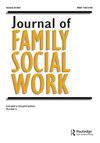军人配偶也要过渡!呼吁采取行动解决配偶的军民过渡问题
IF 0.7
Q3 SOCIAL WORK
引用次数: 14
摘要
军地过渡是指军人退役后重返平民生活的过程。这一MCT过程被认为在就业、健康和社区融合等一系列关键领域具有挑战性。向过渡军事人员提供各种支持、培训和计划,以帮助他们顺利过渡到平民生活。然而,尽管绝大多数过渡退伍军人要么已婚,要么有长期关系,但没有向与退役退伍军人同时过渡的退伍军人配偶提供类似的支持。此外,由于缺乏对退伍军人配偶的调查,他们的经历也没有得到很好的了解。这篇概念性论文呼吁采取行动,调查退伍军人配偶与退伍军人一起过渡到平民生活的经历,并为MCT中这些经常被遗忘但至关重要的合作伙伴提供更多有针对性的服务。本文章由计算机程序翻译,如有差异,请以英文原文为准。
Military spouses transition too! A call to action to address spouses’ military to civilian transition
ABSTRACT Military to Civilian Transition (MCT) is the process experienced by military personnel as they leave service and return to civilian life. This MCT process is thought to be challenging across a range of key areas such as employment, health, and community integration. Transitioning military personnel are offered various supports, trainings, and programs to assist them through the process to achieve successful transition to civilian life. However, despite the fact that a vast majority of transitioning veterans are either married or in a long-term relationship, similar support is not provided to the veteran spouse who simultaneously transitions with the exiting veteran. Moreover, due to a dearth of research investigating veteran spouses, their experiences are not well understood. This conceptual paper is a call to action for research to be conducted to investigate veteran spouses’ experiences as they transition to civilian life alongside their veteran and for an increase in tailored and targeted services to be available for these often forgotten, yet crucial, partners in MCT.
求助全文
通过发布文献求助,成功后即可免费获取论文全文。
去求助
来源期刊

Journal of Family Social Work
SOCIAL WORK-
CiteScore
2.10
自引率
0.00%
发文量
4
期刊介绍:
Each issue of the Journal of Family Social Work contains peer reviewed research articles, conceptual and practice articles, creative works, letters to the editor, and book reviews devoted to innovative family theory and practice subjects. In celebrating social workers" tradition of working with couples and families in their life context, the Journal of Family Social Work features articles which advance the capacity of practitioners to integrate research, theory building, and practice wisdom into their services to families. It is a journal of policy, clinical practice, and research directed to the needs of social workers working with couples and families.
 求助内容:
求助内容: 应助结果提醒方式:
应助结果提醒方式:


